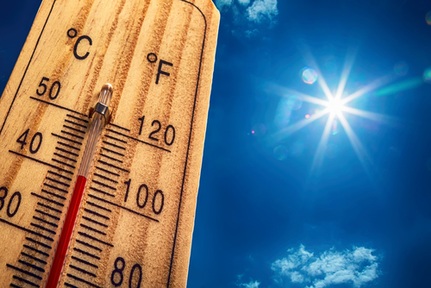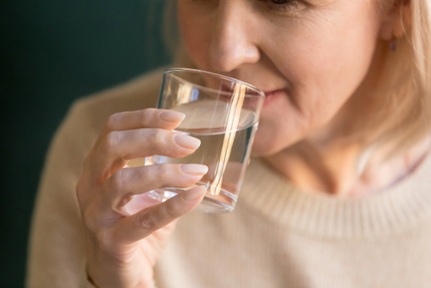Heatwave: Care homes warned to protect residents by avoiding cups of tea, sugary drinks and alcohol
Cups of tea are among the caffeinated drinks, as well as alcohol and very sugary liquids, that care homes should avoid giving residents the government warns, as temperatures are forecast to reach 41C (106F) in the UK.

The Met Office has said the UK faces "a very serious situation” with the hot weather and issued an unprecedented red warning for ‘extreme heat’ in England on Monday and Tuesday. This means even the fit and healthy are at risk of death. The Met office has predicted the UK may have its hottest day ever recorded this week.
The government is warning that the biggest increase in risk of death is among those in care homes. It has now stepped in to update its guidance to care homes by urging staff to ‘advise residents to avoid caffeine (coffee, tea, colas), very sweet drinks and alcohol’.
Strain on the heart
In the government’s heatwave guidance for care homes (updated on 15 July) it recommends residents drink plenty of water. Older people are more at risk of dehydration, heat stroke and heat exhaustion resulting in care homes being urged to take extra precautions.
Government guidance warns: ‘Older people appear to be more vulnerable to heat possibly due to having fewer sweat glands’.
To keep cool, large quantities of extra blood are circulated to the skin. This causes strain on the heart, which for elderly people and those with long-term health problems can be enough to trigger cardiac problems.
The main causes of illness and death during a heatwave are respiratory and cardiovascular diseases. There are also specific heat-related illnesses including:
• heat cramps – caused by dehydratation and loss of electrolytes, often following exercise.
• heat rash – small, red, itchy papules.
• heat oedema – mainly in the ankles, due to vasodilatation and retention of fluid.
• heat syncope – dizziness and fainting, due to dehydratation, cardiovascular disease and certain medications.
• heat exhaustion – is more common. It occurs because of water or sodium depletion and is present when the body temperature is between 37°C and 40°C. Left untreated, heat exhaustion can evolve into heatstroke.
• heatstroke – can become a point of no return whereby the body’s thermoregulation mechanism fails and leads to a medical emergency, with symptoms of: confusion, disorientation, convulsions, hot and dry skin or a core body temperature exceeding 40°C, which can result in death.

The government is urging care home staff to regularly check residents’ body temperature, heart and breathing rates, blood pressure and hydration levels.
It asks staff to ‘watch’ for any changes in residents' behaviour, especially excessive drowsiness and look out for headaches, weakness, giddiness, disorientation or sleeping problems.
The government is also advising staff to try to avoid alcohol consumption by care home residents. Alcohol advice site Drinkaware stated: ‘Alcohol is a diuretic, which means it encourages the kidneys to lose extra fluid.
‘Alcohol also makes you sweat more. The combination of sweating more in the heat, and going to the toilet more, means you lose more fluid than you take in and become dehydrated unless you replace that lost fluid by drinking water.’
Hot weather at-risk groups include:
• older people, especially those aged 75+ or those living on their own and who are socially isolated or in a care home.
• those with chronic and severe illness, including heart conditions, diabetes, respiratory or renal insufficiency, Parkinson’s disease or severe mental illness.
• those on medications that potentially affect renal function, sweating, thermoregulation or electrolyte balance.
• those who are unable to adapt their behaviour to keep cool, including those with Alzheimer’s, disabilities, or who are bed bound.
Serving food with high water content
Helene Ballinger, resident experience manager at Bupa’s Southlands Care Home in Harrogate said: “Whilst the hot weather is putting most of the UK in a great mood, the rising temperatures can lead to a long list of health problems, especially for your elderly loved ones.
“As we get older, our bodies are less able to cope with the rising temperatures, leaving us at greater risk of dehydration, heat exhaustion and heatstroke. If your older relative or friend has diabetes and lung disease, this can further reduce their ability to cope with the heatwave.”
Bupa has said it is ensuring its residents head outdoors at cooler times either early in the morning or later in the evening when the temperature is cooler.
While people’s appetites naturally reduce in the heat because the body is trying to keep cool. To replenish water lost from the body through excessive sweating, care home staff are getting “creative” to keep their residents hydrated by swapping any hot drinks with juices, smoothies, or occasionally an ice lolly.
Bupa has advised serving food with a high-water content such as spinach, lettuce, cucumber, celery, and radishes and melons.
Some care homes are keeping curtains and blinds closed in rooms that catch the sun.
Heat exhaustion occurs when your body is unable to cool itself enough to maintain a healthy temperature and the person needs to be cooled down. However, heatstroke should be treated as an emergency.
Heat exhaustion often has symptoms such as a throbbing headache, dizziness, confusion, cramping and nausea. If a person has symptoms, unnecessary clothing can be removed and the person can lie down, and raise their feet so they are above heart level. Staff can also use a cool sponge to cool their skin. If the individual doesn’t start to cool down and feel better after 30 minutes, they should see a medical professional, as they may have developed heatstroke.
According to the Office for National Statistics (ONS), the most vulnerable people (such as those with pre-existing respiratory or cerebrovascular diseases like stroke) are more susceptible to death during heatwaves.
In one hot 10-day period in south-east England in August 2003, there were nearly 2,000 extra deaths. The government’s care home guidance warns part of the rise in deaths ‘may be attributable to air pollution, which makes respiratory symptoms worse’.
A freephone service run by Defra on 0800 55 66 77 and via Defra's website gives regular updates on air pollution levels (including levels of particulate matters (PM10), sulphur dioxide, nitrogen dioxide, ozone and carbon monoxide) in local areas.
Deaths still higher in winter
While the hot summer weather has ‘some effect on deaths’, the ONS has stated ‘the effect of winter is greater, as shown in our excess winter mortality reports.’
Care homes are also reminding staff to take care of themselves in the heat with sun protection, keeping hydrated and taking rests.
Prior to the government's updated guidance, many care homes had already adopted ways of keeping residents cool.
Cavell Manor Care Home in Woodbridge has said that when it comes to keeping cool in the heat: “Our residents enjoyed ice lollies, coke, and cream soda ice cream floats, as well as fruit juices and not forgetting the favourite cup of tea.
“Keeping hydrated has many benefits and our residents learned about them and the importance of why we need to drink more and other ways of keeping hydrated.”
Latest News
 29-Jul-24
Dementia Bus gives carehome.co.uk staff insight into life with dementia
29-Jul-24
Dementia Bus gives carehome.co.uk staff insight into life with dementia
 01-Mar-24
Find out the top care homes in 2024
01-Mar-24
Find out the top care homes in 2024
 21-Mar-23
UK's top care homes in 2023 revealed
21-Mar-23
UK's top care homes in 2023 revealed
 03-Jan-23
carehome.co.uk launches free care helpline
03-Jan-23
carehome.co.uk launches free care helpline
 13-Dec-22
5 mins with Emily Whitehurst, chief operating officer for Constantia Healthcare
13-Dec-22
5 mins with Emily Whitehurst, chief operating officer for Constantia Healthcare